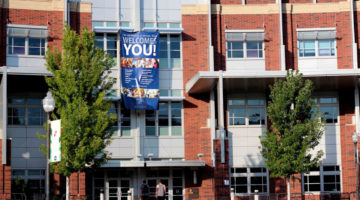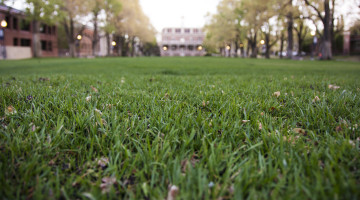
Photo courtesy of Taslima Shams
Students participate in a mock caucus inside the Mathewson-IGT Knowledge Center on Monday, Oct. 26. The mock caucus aimed to teach students exactly how caucuses work.
by Jacob Solis
Since the spring, America has been gripped in campaign fever. Dozens of candidates from both sides of the political spectrum have been vying furiously for the votes of the American people, but what is it all for?
In Nevada, these candidates are aiming for victory in the caucus — an age-old tradition of impassioned arguing and standing on one side of the room to select presidential nominees. It’s a process that confounds many, so Associated Students of the University of Nevada pre-empted the confusion with its very own mock caucus on Monday, Oct. 26.
The mock caucus, or mockus, was held in the Mathewson-IGT Knowledge Center’s Rotunda and was put together by ASUN’s Department of Legislative Affairs. ASUN reached out to both political parties and other community organizations, like the Progressive Leadership Alliance of Nevada, to help put everything together.
For Legislative Affairs Projects Coordinator Rebekah Couper, the event was a success, being fun, informative and a convincing method to push students toward actually caucusing come February.
“I’ve had a few people walk and say, ‘I wasn’t gonna go to the caucus, but now I am,’” Couper said. “That’s the whole point. If I get one student to go, it’s a success.”
Couper added that the caucus allows students’ voices to be heard and that rooting for a candidate and convincing others to caucus for a candidate is an awesome experience for anyone.
For the mockus, the 40 or so students who turned up throughout the day kept things nonpartisan and vied for the success of different ice cream toppings. Grant Bertonneau, a freshman at the university, stood on the chocolatey side of things.
“I caucused for fudge, and I was basically forced to be the spokesperson for it,” Bertonneau said. “I did a kind of seriocomic speech for it where I kept posture, as if it was a real thing, but I talked about ridiculous things relating to fudge.”
Fudge went on to win the caucus, beating out the strong contenders of strawberries and nuts.
Ultimately though, the point of the mockus was to teach students what caucusing is all about. For Courtney McKimmey, a UNR student and president of Nevada Students for Hillary, the mockus did just that.
“I think for the students that showed up, it was a good chance to see what it’s gonna look like,” McKimmey said. “I don’t think many students knew exactly what the caucus was, and I hope we can have more events like this and get even more students involved.”
McKimmey added that many people don’t know or understand the caucus system, particularly the fact that you need to be present at the caucus in order to have your vote counted, unlike a primary.
But why a caucus in the first place?
Nevada is one of 13 states that uses the caucus system, according to the Federal Election Commission. Most caucus states only have a few delegates to give out during the nominating conventions. These delegates and superdelegates are used during the conventions to officially determine who will be each party’s nominee.
In Nevada, caucuses parcel out delegates proportionally, depending on what percentage of caucus-goers caucus for a certain candidate. On top of that, Democratic delegates are joined by so-called superdelegates — representatives of a state who are unbound by the results of the caucus. After moving through the county and state party organizations, these delegates have the final say on who is nominated by each party to be standard bearer.
The caucus, as a method of candidate-selection, has one real advantage over the other nominee-selecting process, the primary. The caucus gives a greater say to people in rural areas, at least according to Matt Bai of The New York Times. In Nevada especially, where census data puts the number of city-dwellers at 88 percent of the state’s population, a primary might unfairly favor the opinions of urban voters who can flex their majority muscles.
Even so, the caucus is esoteric and often hard to understand, which leaves many voters scratching their heads and feeling left out of the process.
“Caucuses can be very complicated, to be honest, [but] caucuses are very important because not many people participate,” said Taslima Shams, president of the UNR Young Democrats.
Even so, some remain unconvinced that the caucus is the best way to go.
“It increases the benefits for the few people who do [caucus], but maybe I’d prefer to see it go so that we could get more people involved, so it’d be easy like a primary system,” said Legislative Affairs Director Marissa Crook. “I think caucuses are more engaging than primaries, but I think primaries engage more people.”
Nevada’s Democratic caucus is on Saturday, Feb. 20, while the Republican caucus is on Tuesday, Feb. 23.
Jacob Solis can be reached at jsolis@sagebrush.unr.edu and on Twitter @TheSagebrush.











